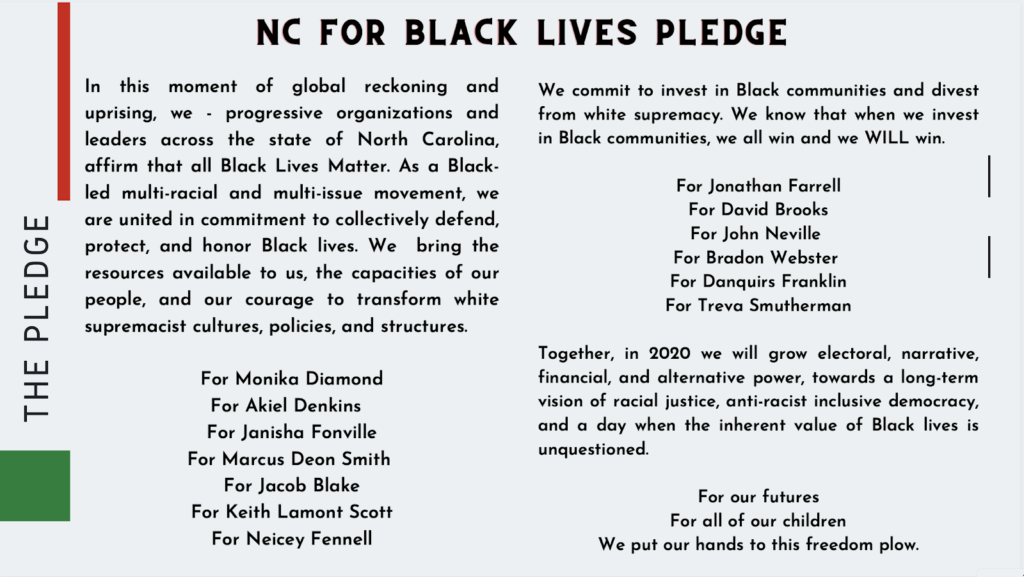Table of Contents
Voting Resources in NC
NC4BL: is a statewide campaign & platform dedicated to investing in Black Communities & divesting from white supremacy and the prison industrial complex. Take the pledge and learn more.

Criminal Justice on the Ballot
-
- North Carolina 2020 Voter Guide by Democracy NC and Common Cause features candidates for federal and statewide offices in NC. Some of these offices are SUPER IMPORTANT for criminal justice issues including:
-
-
- NC Supreme Court: 3 of the 7 seats are up for election
- NC Court of Appeals: 5 of the 15 seats are up (Judges on the NC Court of Appeals hear appeals of criminal and civil cases from the District and Superior Courts, the trial courts in NC.)
- Governor: has the power to issue Executive Orders regarding Adult Corrections, Immigration Enforcement, etc.
- Lieutenant Governor:
- Attorney General: heads the NC Department of Justice, which protects consumers from fraud, provides legal representation to State agencies, and is a resource for local District Attorneys and other parts of the justice system.
- Superintendent of Public Instruction: The Superintendent heads the NC Department of Public Instruction. It oversees NC’s pre-K to 12th grade public schools, implements the policies of an independent State Board of Education, and licenses teachers. This person can provide direction for racial equity efforts that don’t criminalize our young people.
- NC General Assembly members: They are elected for 2-year terms to pass the state budget and laws affecting jobs, healthcare, racial justice, the environment, schools, and more.
-
-
- North Carolina 2020 Voter Guide by Democracy NC and Common Cause features candidates for federal and statewide offices in NC. Some of these offices are SUPER IMPORTANT for criminal justice issues including:
- ACLU-NC Scorecard for Mecklenburg County Commissioners, Wake County Commissioners, and Wake County School Board
National Resources
Community Resource Hub:
The Community Resource Hub for Safety and Accountability works to ensure all people have access to resources and tools to advocate for systems change and accountability in law enforcement.
- National Police Funding Database – Using Data to Promote Fair & Accountable Policing Practices: This is a first-of-its-kind portal that augments the work of the Policing Reform Campaign and provides publicly available data on federal grants awarded to over 150 local law enforcement agencies across the nation. The database provides demographic data for those jurisdictions and, where available, information on police misconduct complaints filed by individuals, consent decrees, and settlement amounts. Communities can use this information to support demands for accountability for law enforcement agencies believed to be engaged in discriminatory or otherwise unlawful conduct. The grant data on this database is updated monthly; all other information is updated semi-annually.
- Submit your own resources here
NC Reports & Visions
- Durham Beyond Policing’s Safety & Wellness Taskforce: Durham Beyond Policing is a grassroots coalition to divest from policing and prisons and reinvest municipal resources into supporting the health and wellbeing of Black & Brown communities, benefiting all community members in Durham, NC. The coalition developed this proposal because the draft budget for the City of Durham for 2019-20 contained a request from the DPD for 72 additional full time (FTE) officers over three years, with the first year’s cost given as $1,729,573 for an initial 25 new officers. After considerable study, we have found the rationale for DPD’s budget request is incomplete and outdated, and we object to the premise that more officers will make the people of Durham safer. This proposal offers what we feel is a more holistic approach to some of the same issues and opportunities.
- Civilian Review Board Comparisons (forthcoming):
Useful Toolkits
- Defund the Police and Rebuild our Communities: There’s a shift happening right now. The call to defund police is louder than we’ve ever heard it. We can all answer that call and reshape what our communities look like. We made a toolkit to help you map what you can do in your cities.
- Interrupting Criminalization: Interrupting Criminalization: Research in Action is an initiative at the BCRW Social Justice Institute led by researchers Woods Ervin, Mariame Kaba, and Andrea J. Ritchie. The project aims to interrupt and end the growing criminalization and incarceration of women and LGBTQ people of color for criminalized acts related to public order, poverty, child welfare, drug use, survival, and self-defense, including criminalization and incarceration of survivors of violence.
- Steps to End Prisons and Policing: A Mixtape on Transformative Justice This mixtape is an offering of nourishment and care to the abolitionist community. Learn from some of the people who have been practicing and thinking about and creating organizations around Transformative Justice over the last two decades.
- How To Take Back The Budget: Your voice matters Public budgets are moral documents that institutionalize what community values and how it carries out those values. As such, public budgets should reflect the values and the needs of the community they serve. To do that, public budgets need your voice. This comprehensive guide to reviewing your city or county budget will explain how to argue for changes in police staffing and funding to your local policymakers. The advice in this guide is based on my experience doing in-depth budget reviews of police departments in cities and counties across the country as well as working as a budget analyst in state government.
- Defunding Sheriffs Toolkit (forthcoming):
